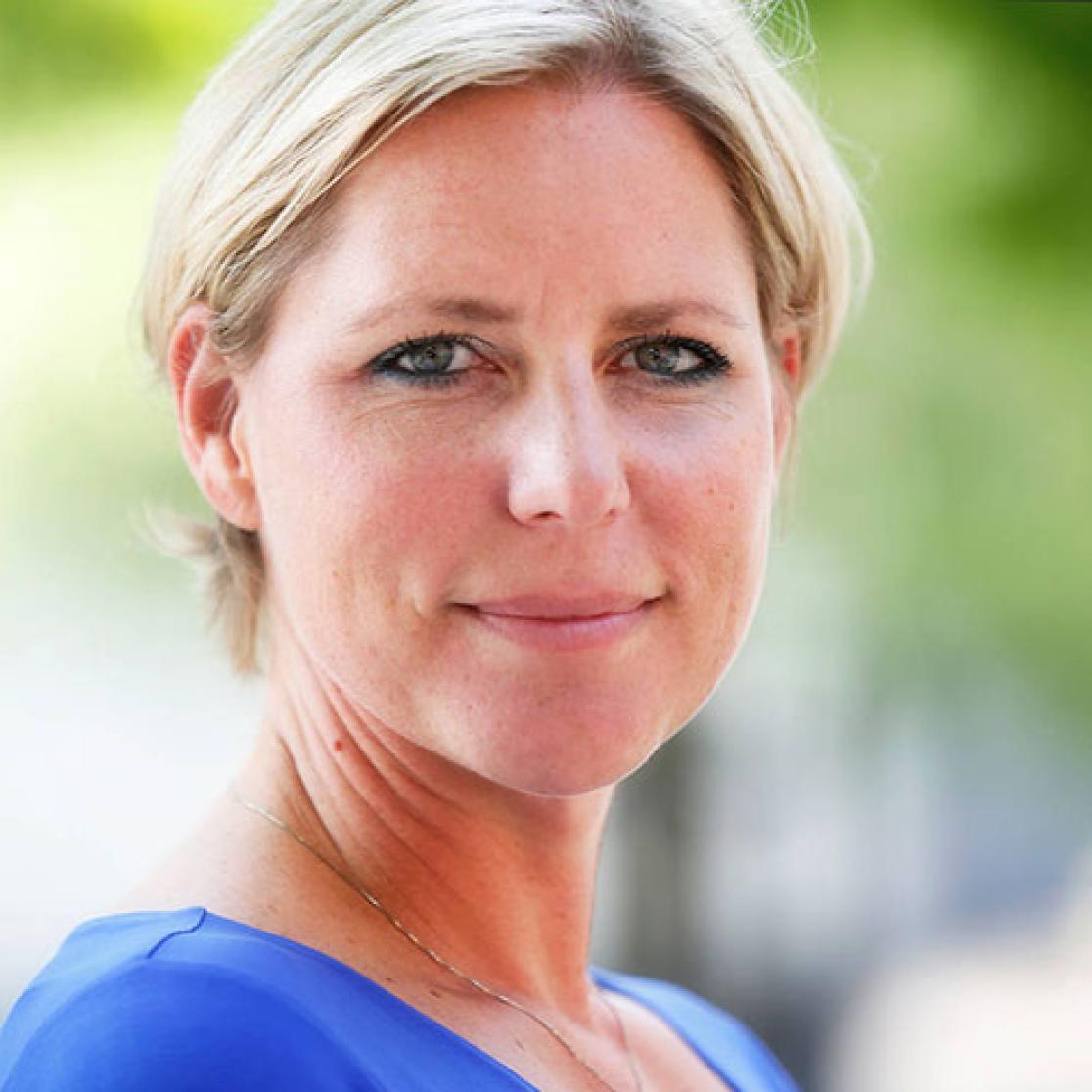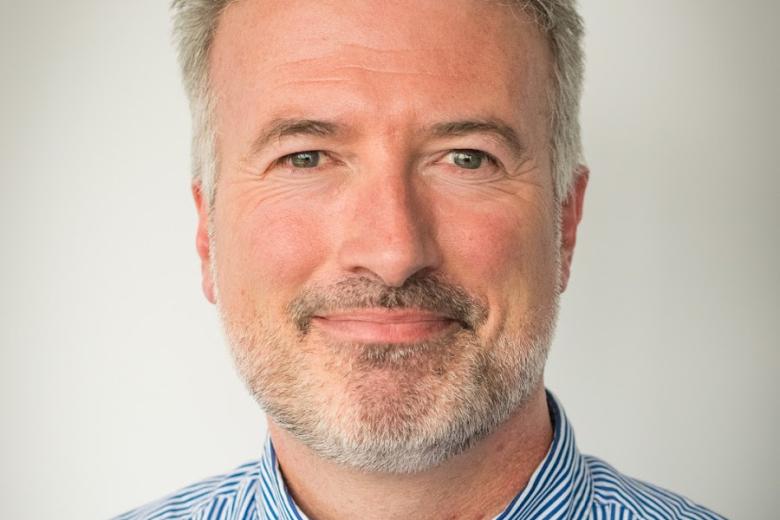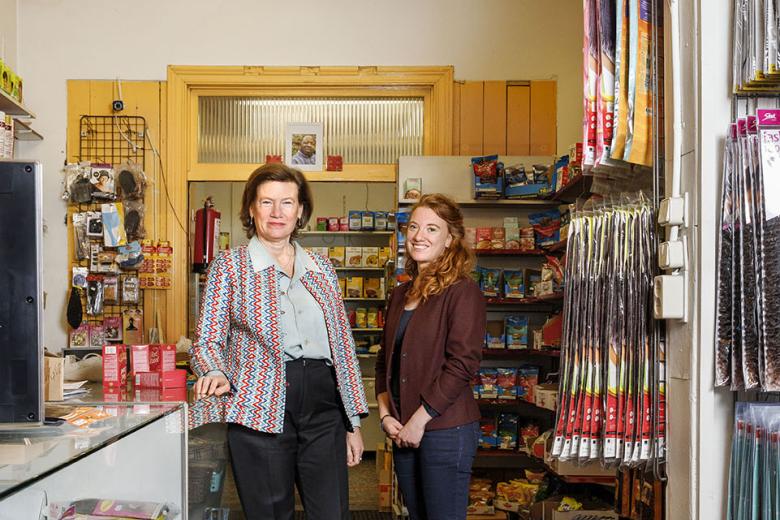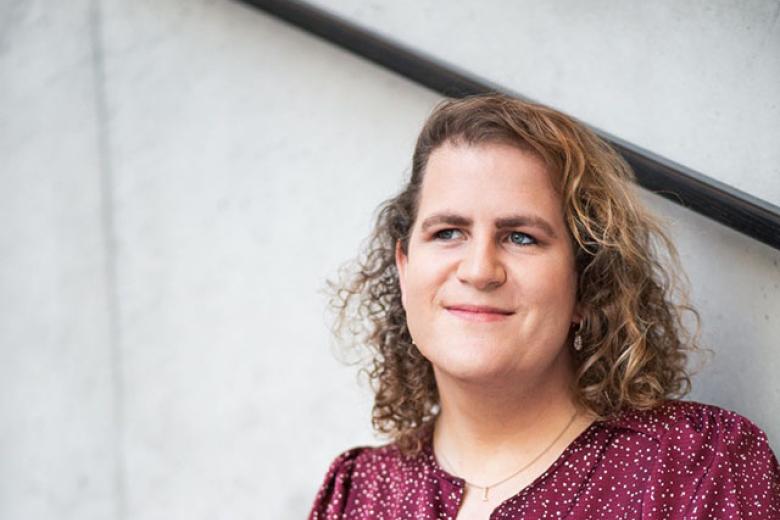Rector Magnificus Rianne Letschert in 20 words
She will not be presenting a 10-step plan for Maastricht University today – she can hardly be expected to know all the ins and outs of the place yet. But she has been around the world of higher education long enough to know there is room for improvement. And as the youngest female rector in the Netherlands, she is looking forward to making some changes. But first, the big unveiling: it's 1 September 2016, Professor Rianne Letschert (39) introduces herself to the academic community in 20 key words.
- Laughing power woman
“That’s how the Volkskrant put it. Some feminists in the Netherlands took issue with the description, but I didn’t mind it. I do like a bit of cheerfulness, despite the fact that my research field is not particularly cheerful. Or maybe precisely because of that.” - Lucky
“This is more how I see myself. I have a nice job, healthy children, a wonderful husband and good things seem to come my way. And I live in a rich country. When I look at the situation refugees find themselves in, it really hits home how lucky I am to have been born in the Netherlands.” - Optimist
“Last summer my father had a stroke. People were saying, ‘How awful to have to deal with that at this point!’, but for me the glass is really half full. He’s still here and he’s working hard on his recuperation.” - Relativiser
“When I see emotions running high for no good reason, I’ll say, ‘We’re not trying to resolve the Israeli-Palestinian conflict here, are we?’ I put the situation into perspective based on what I’ve seen in post-conflict areas thanks to my research on victimhood. Which is not to say I compare everything to the Rwandan genocide; I just think we shouldn’t make mountains out of molehills.” - Perfectionist
“That’s me, it’s true, but I don’t expect everyone around me to be perfectionists too. A colleague once said to me, ‘I feel like I can never make a mistake, because you never do.’ I certainly do make mistakes, and that’s not at all the kind of example I want to set.” - Hard worker
“I do have a work ethic I’ll never be able to shake. Work is also a hobby for me. My husband has a flexible job and my mother retired to help look after Joep (9) and Julia (5), so that allows me to put in a lot of hours. But as a rule, I don’t work Friday evenings and Saturdays – that’s family time. Sundays I go running and I get back to work after dinner.” - Good sleeper
“In October I’m heading to Lebanon to do field work, a trip that had been planned for a while. Work never keeps me up at night, even the terrible things I’ve seen done to people in areas like that. If it did you just couldn’t do this sort of work.” - People person
“In Léon de Caluwé’s colour theory I’m red and yellow. Red stands for a highly developed sense of family. My strength lies in creating groups and motivating people. I want to inspire students and staff to do what they’re good at. You only have one life. Why would you want to spend your time on a degree or a job that doesn’t give you energy?” - Tough
“I can be tough too, if I think something isn’t right. When people just complain without trying to come up with solutions, or bring a lot of negativity into a group, I can turn very ‘yellow’. Because I feel you’re then doing an injustice to the organisation. I’m willing to go a long way to help people, but there’s also a point where enough is enough. That happens too rarely at universities. We cut people a lot of slack, and yet we’re being paid with taxpayers’ money.” - Even yellower
“When someone stabs me in the back, badmouthing my work or my decisions behind my back without saying anything to me. You can do that once or twice, but after that we’re done. Or when people act only in their own interests; they have some explaining to do too.” - Idealist
“I don’t have much time for people who say, ‘That’s how it has to be, because that’s how the system is’. We, all of us, we are the system. We’re personally responsible for changing things in the university system. I genuinely believe that we can, and that I have a role to play in that.” - Diversity
“That’s going to be one of my priorities in this job. Women, minorities, but also over 65s who don’t want to retire yet and still have a lot to offer. I’ll be fighting in their corner. But I also want to challenge the idea that all researchers have to feel perfectly at home in all areas – high-impact publications, big grants, stellar teaching, top media performances...” - Impatient
“If I think something can be done faster, I tend to get impatient. For instance, I’ve always said that quotas are something for fishing, not for women in leadership positions. But I’m slowly starting to change my mind. If we stick to the current rate of change in the Netherlands, we still won’t have achieved our goals by 2080. Then I start to get antsy and I think: maybe we should do things differently here in Maastricht.” - Informal
“I can be formal when I need to be, but if it’s not necessary I don’t like hierarchy, status and egos. People sometimes think they need to act a certain way because I’m the rector, but because I don’t do that myself, that thought goes out the door pretty quickly. I don’t have a big ego and I’m not easily offended. Perhaps that’s a weakness, because it means you sometimes accept things for too long, but I rarely take things personally. That makes things easy for me and others. You won’t get into an argument with me all too quickly. And there’s definitely no need to put on an act.” - Honest
“When I left Tilburg, I said that getting the Vidi grant last year came down to teamwork. It’s nonsense that they’re referred to as ‘individual’ grants. People saw that as provocative, but everyone knows that’s how it is. Of course academics who get these grants work extremely hard and I’m happy for those who succeed, but you have to acknowledge it’s a group effort. That’s why I’m leaving the project and the grant and the people in Tilburg behind.” - Mother Theresa
“Haha, that’s definitely not me. I like helping people, but don’t we all do that partly because it makes us feel good about ourselves?” - Confronting
“A while back I spoke with Sander Dekker, the state secretary for Education, Culture and Science, about his idea to have academics describe how their Veni, Vidi and Vici project proposals fit with the National Research Agenda. That strikes me as undesirable, which is what I told him. ‘Sure, we can all make it look like every proposal fits perfectly – we’re not stupid. But then we’re just giving you blah blah blah and that’s not what you want.’ Of course you have to think in advance about the type of research you’re doing and why. But it’s okay if nothing immediately applicable comes out of it, or if it doesn’t line up exactly with the National Research Agenda.” - Travelling circus
“That was me over the past year, with thee workplaces in three different locations. I was chair of the Young Academy in Amsterdam, fellow at the Netherlands Institute of Advanced Studies in Wassenaar, and professor of Victimology and International Law and director of the Victimology Institute in Tilburg. During the week I wasn’t even bothering to unpack my suitcase and I barely ate at home with the family at all. Now it’s Maastricht and my home in Helmond, which serves as a nice jumping-off point for the meetings I’ll have around the country as rector. I think things are going to be less hectic. But I always underestimate my calendar, so we’ll see.” - Mother and daughter
“Of course I sometimes find it hard if I miss the kids’ things at school. But this is what I’ve chosen for myself, so I can’t complain. If there’s ever something really wrong at home I drop everything, like when my father had that stroke. As far as I’m concerned everyone at UM can do the same. While also realising how nice it is that your work gives you that space – not everyone gets the privilege.” - Bridge builder
“I have a real problem with the distinction between academic and support or administrative staff at universities. We all work at the same institution, with the same goal; together we can make things better, and otherwise it’ll be no good at all.”

Also read
-
Empowering Smallholder Farmers in the Data Economy: Unlocking Opportunities and Overcoming Obstacles
Frederik Claasen, the head of policy at our partner organisation Solidaridad Network on the opportunities and obstacles facing smallholder farmers in their data ecosystems.

-
How do involuntarily returned migrants fare in Senegal?
The PhD research of Karlien Strijbosch focuses on Senegalese migrants who were forced to return home after a stay in Europe. Doing justice to such stories is no easy feat, especially when you come up against walls of silence, distrust and shame. Strijbosch and her supervisor Valentina Mazzucato...

-
Soft landing in Vienna
After several rocky years, Maastricht University alum Lea Vink has found her feet in Vienna. Professionally, she is taking new steps at the crossroads of aviation and organisational psychology. And on a personal level, luck has smiled on her since her transition from man to woman.
